
hill_l_a_elementary_stories_for_reproduction_2
.pdf
Elementary Stories
for Reproduction
Second Series
L.A. HILL
OXFORD UNIVERSITY PRESS
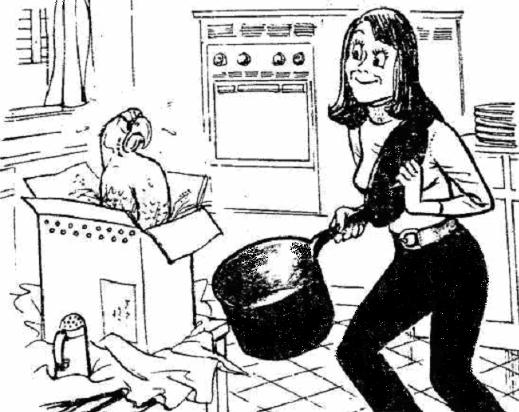
1
Jack was a young sailor. He lived in England, but he was often away with his ship.
One summer he came back from a long voyage and found new neighbours near his mother’s house. They had a pretty daughter, and Jack soon loved her very much.
He said to her, ‘My next voyage will begin in a few days’ time, Gloria. I love you, and I’ll marry you when I come back. I’ll think about you all the time, and I’ll write to you and send you a present from every port.’
Jack’s first port was Freetown in Africa, and he sent Gloria a parrot from there. It spoke five languages.
When Jack’s ship reached Australia, there was a letter from Gloria. It said, ‘Thank you for the parrot, Jack. It tasted much better than a chicken.’
Words outside the 1000: parrot, sailor
4
A.Answer these questions.
1.Why did Jack make long voyages?
2.Where did Gloria live?
3.Why did Jack think about Gloria all the time?
4.Where did Jack send Gloria the parrot from?
5.Where did Jack get Gloria’s letter about the parrot?
6.What did Gloria do to the parrot?
B.Which words in the story on page 4 mean the opposite of:
1. short |
4. old |
7. worse |
2. last |
3. little |
|
3. ugly |
6. winter |
|
C.Write this story. Put one word in each empty place. You will find all the correct words in the story on page 4.
Freetown is a . . . . in West Africa. Jack and another . . . . from his ship went into a shop there and saw a beautiful bird. It was a red and grey . . . . and it . . . . ‘Hullo,’ to them. Jack said to his friend, ‘I’m going . . . . it to Gloria.
She’s the daughter of my mother’s . . . . It will be a nice . . . . for her,’ Then Jack and his friend . . . . a restaurant and ate . . . . and fried potatoes there. They . . . . very good.
5

2
Fanny and Ethel worked in the same office, and, they were neighbours at home. Fanny was rather a careless girl, and he often lost things. Then she usually went to Ethel to borrow more from her.
Ethel was a kind girl, but she sometimes got tired of lending things to her friend.
One Saturday afternoon Fanny knocked at Ethel’s front door, and when Ethel came to open it, Fanny said to her, ‘Oh, hullo, Ethel. Please lend me a bag. I’ve lost mine. I’m going to the shops, and I feel very stupid when I haven’t got anything in my hand when I go out in the street.’
Ethel laughed and answered, ‘Well, Fanny, go down to the end of the garden. You’ll find a nice wheelbarrow in the shed there. Take that when you go down to the shops. Then you’ll have something in both of your hands.’
Word outside the 1000: wheelbarrow
6
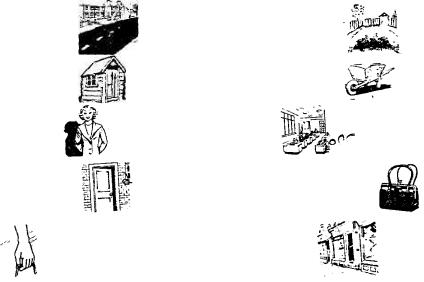
A.Answer these questions.
1.Why did Fanny often lose things?
2.Why did Ethel lend things to Fanny?
3.Why didn’t Fanny want to go to the shops without a bag?
4.Why didn’t Ethel lend her a bag?
5.What did she want Fanny to take to the shops?
6.Did Fanny take it, do you think?
B.Which of these sentences are true? Write the correct ones down.
1.Ethel often borrowed things.
2.Fanny often borrowed things.
3.Ethel often lent things to Fanny.
4.Fanny often lent things to Ethel.
5.One day Ethel lost her bag.
6.One day Fanny lost her bag.
7.Fanny liked carrying something in her hand.
8.Fanny did not like carrying things.
9.There was a shed at the end of Ethel’s garden.
10.There was a shed at the end of Fanny’s garden.
C.Write this story, but do not put pictures: put words.
Ethel’s house is in a small
at the back, and there is a
there. Ethel is a clever
This is Ethel. She is at the
in her left
. It has a small |
|
in it. Ethel keeps her |
|
. She works in a |
. |
of her house, and she’s got a |
|
, because she is going to the |
. |
7
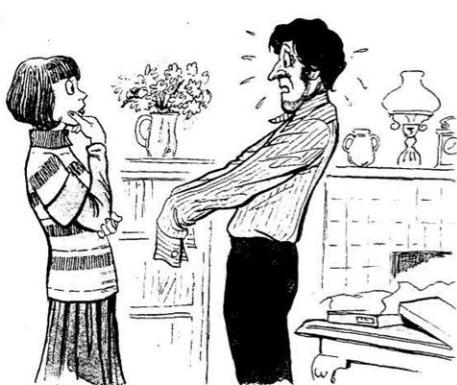
3
Dave married, and when his new wife saw the clothes in his cupboard, she said, ‘Dave, you have only got one good shirt. The others are very old, and they’ve got holes in them. I’m going to buy you a new one this afternoon.’
Dave liked his old shirts, but he loved his wife too, so he said, ‘All right, Beryl, but please don’t throw any of the old ones away.’
Dave went to work, and when he came back in the evening, Beryl said to him, ‘Look, Dave, I’ve bought you a nice shirt. Here it is. Put it on.’
Dave put the shirt on, and then he said, ‘Look at the sleeves, Beryl. They’re too long.’
‘That’s all right,’ Beryl answered. ‘They’ll get shorter when I wash the shirt.’ Then Dave said, ‘But the neck’s too small.’
‘That’s all right,’ Beryl answered. ‘It’ll get bigger when you wear the shirt, Dave.’
Word outside the 1000: sleeve
8
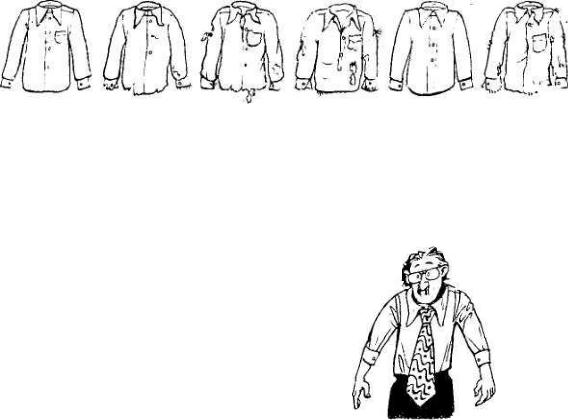
A.Answer these questions.
1.Why did Beryl want to buy Dave a new shirt?
2.Why didn’t Dave want his wife to throw any of his old shirts away?
3.Why didn’t Dave like the sleeves of his new shirt?
4.What did Beryl say about the sleeves?
5.Why didn’t Dave like the collar of the shirt?
6.What did Beryl say about the collar?
B.Opposites. Write these sentences. Put one word in each empty place.
1.New clothes do not have holes in them, but . . . ones sometimes
do.
2.Sleeves don’t get . . . when you wash them. They get shorter.
3.Good shirts are not cheap. They are . . . .
4.The neck of Dave’s shirt wasn’t too big. It was too . . . .
5.Dave loved his old shirts, but he . . . his new one.
C. Choose the right sentence for each picture and write it down.
1.a. None of these shirts has got holes in it.
b.Some of these shirts have got holes in them.
c.All of these shirts have got holes in them.
2.a. The sleeves are too long,
and the collar is too small.
b.The sleeves are too short, and the collar is too small.
c.The sleeves are too short, and the collar is too big.
d.The sleeves are too long, and the collar is too big.
9

4
Mrs. Williams lived in a small street in London, and now she had a new neighbour. Her name was Mrs. Briggs, and she talked a lot about her expensive furniture, her beautiful carpets and her new kitchen.
‘Do you know,’ she said to Mrs. Williams one day, ‘I’ve got a new dishwasher. It washes the plates and glasses and knives and forks beautifully.’
‘Oh?’ Mrs. Williams answered. ‘And does it dry them and put them in the cupboard too?’
Mrs. Briggs was surprised. ‘Well,’ she answered, ‘the things in the machine are dry after an hour, but it doesn’t put them away, of course.’
‘I’ve had a dishwasher for twelve and a half years,’ Mrs. Williams said.
‘Oh?’ Mrs. Briggs answered. ‘And does yours put the things in the cupboard when it has washed them?’ She laughed nastily.
‘Yes, he does,’ Mrs. Williams answered. ‘He dries the dishes and puts them away.’
Word outside the 1000: dishwasher
10
A.Answer these questions.
1.Where did Mrs. Briggs live?
2.Why was Mrs. Briggs surprised?
3.Did Mrs. Briggs’s dishwasher dry the plates and other things?
4.Did it put them away?
5.Did Mrs. Williams’s dishwasher put the things in the cupboard?
6.Who was Mrs. Williams’s dishwasher?
B.Write these sentences. Put one of these words in each empty place:
an |
any |
no |
none |
some |
1.Mrs. Briggs was rich, but Mrs. Williams was not. Mrs. Briggs had
. . . beautiful carpets, but Mrs. Williams didn’t have . . . .
2.Mrs. Briggs had . . . expensive furniture, but Mrs. Williams had . . . .
3.Mrs. Briggs had . . . expensive dishwasher, but Mrs. Williams did not have . . . machines in her kitchen.
4. Mrs. Briggs had . . . nice roses in her garden, but Mrs. Williams had
. . . flowers in hers.
5.Mrs. Briggs had . . . big trees in her garden too, but Mrs. Williams had . . . .
C.Write this story. Put one of these words in each empty place:
he |
him |
his |
her |
it |
its |
she |
Mrs. Williams had a good baby: . . . never cried, and . . . clothes were always clean. Mrs. Briggs was very surprised and said, ‘When my daughter was small, I gave . . . lots of food, but . . . cried a lot, and . . . clothes were always dirty. Why is your baby so different? How do you do . . . ?’
‘Well,’ answered Mrs. Williams, ‘my first child was a boy. I always gave
. . . a lot of food, . . . got very fat, and . . . stomach was always full. He cried a lot and was dirty. Now I give my new baby much less, and . . . is happy and clean.’
11
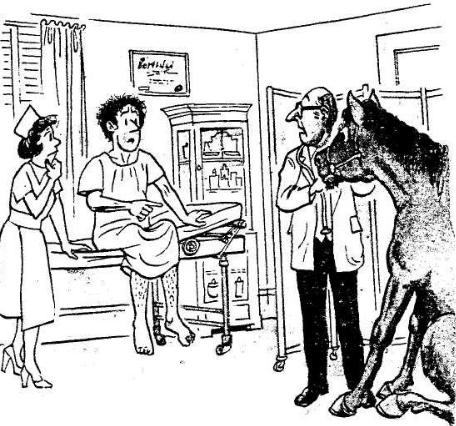
5
One day a man went to see his doctor and said to him, ‘I’ve swallowed a horse, doctor, and I feel very ill.’
The doctor thought for a few seconds and then said, ‘All right, Mr. Lloyd, I’ll help you. Please lie down on this bed.’
The doctor’s nurse gave the man an injection, the man went to sleep, and the doctor went out quickly to look for a horse in the town.
After half an hour he found one, borrowed it and took it into his office, so when Mr. Lloyd woke up, it was there in front of him.
‘Here’s the horse, Mr. Lloyd,’ the doctor said. ‘I’ve taken it out of your stomach, and it won’t give you any more trouble now.’
At first Mr. Lloyd was happy, but then he looked at the horse again and said, ‘But, doctor, my horse was white, and this one’s brown!’
Word outside the 1000: swallowed
12
